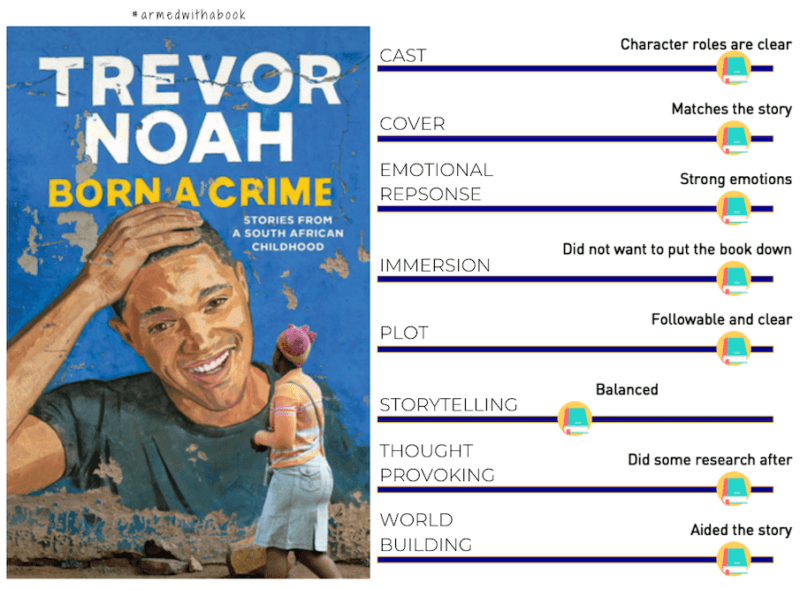I first learned about South Africa in Geography and History classes back in school. You can guess why it was mentioned in Geography, but History wise, South Africa came up because Mahatma Gandhi, the Father of the Nation of India (where I grew up) practiced law in South Africa before joining the freedom struggle in India. When I was setting out my reads for My History Reading Map, Born A Crime Stories From a South African Childhood is the first one I added in and I am thrilled to share about. Take a look at the synopsis below.

The compelling, inspiring, and comically sublime New York Times bestseller about one man’s coming-of-age, set during the twilight of apartheid and the tumultuous days of freedom that followed.
Trevor Noah’s unlikely path from apartheid South Africa to the desk of The Daily Show began with a criminal act: his birth. Trevor was born to a white Swiss father and a black Xhosa mother at a time when such a union was punishable by five years in prison. Living proof of his parents’ indiscretion, Trevor was kept mostly indoors for the earliest years of his life, bound by the extreme and often absurd measures his mother took to hide him from a government that could, at any moment, steal him away. Finally liberated by the end of South Africa’s tyrannical white rule, Trevor and his mother set forth on a grand adventure, living openly and freely and embracing the opportunities won by a centuries-long struggle.
Born a Crime is the story of a mischievous young boy who grows into a restless young man as he struggles to find himself in a world where he was never supposed to exist. It is also the story of that young man’s relationship with his fearless, rebellious, and fervently religious mother—his teammate, a woman determined to save her son from the cycle of poverty, violence, and abuse that would ultimately threaten her own life.
The eighteen personal essays collected here are by turns hilarious, dramatic, and deeply affecting. Whether subsisting on caterpillars for dinner during hard times, being thrown from a moving car during an attempted kidnapping, or just trying to survive the life-and-death pitfalls of dating in high school, Trevor illuminates his curious world with an incisive wit and unflinching honesty. His stories weave together to form a moving and searingly funny portrait of a boy making his way through a damaged world in a dangerous time, armed only with a keen sense of humor and a mother’s unconventional, unconditional love.
Content Notes: Some descriptions of violence, including domestic violence.
The Setting: A Brief History of South Africa
In 1910, the Union of South Africa was formed by former British colonies of the Cape and Natal, and the Boer republics of Transvaal, and Orange Free State. It was in 1948 that Apartheid was adopted. Under Apartheid, the population was classified by race. Group Areas Act passed to segregate blacks and whites. Born A Crime is Trevor Noah’s story, covering the last couple years before Apartheid ended and the years after.
Apartheid (“apartness” in the language of Afrikaans) was a system of legislation that upheld segregationist policies against non-white citizens of South Africa. After the National Party gained power in South Africa in 1948, its all-white government immediately began enforcing existing policies of racial segregation. Under apartheid, nonwhite South Africans (a majority of the population) would be forced to live in separate areas from whites and use separate public facilities. Contact between the two groups would be limited. Despite strong and consistent opposition to apartheid within and outside of South Africa, its laws remained in effect for the better part of 50 years.
Apartheid in South Africa
Here is something that I did not know until I read this book – I always thought Apartheid was a segregation policy set by colonizers. I thought that probably in relation to India’s history and how India got freedom from British rule in the late 1940s. I did not even think that South Africa would already have veining European influence. The Afrikaanas, the people of European descent who had made South Africa their home during the colonization, wanted to keep power in their hands.
To see South Africa at a glance, please refer to South Africa profile – Timeline.
Thoughts as I read Born A Crime
Trevor was the son of a black woman and a white man. Though he grew up with his mom’s side of the family, he was labeled as colored. Trevor tells tales of how his existence at his grandma’s house would often to be used as a marker to tell people the way around the neighbourhood. Born A Crime is a heartbreaking and captivating story about trying to belong and finding a place for oneself in the world, inspite of institutional policies, religion and more.
I love the analogies that Trevor used. Even though it was hard to live under Apartheid, Trevor’s mom never left her country. When he later learned that a lot of colored people and their families had take exile outside South Africa, Trevor learning that there had even been the option to leave was something that never crossed in mind.
Imagine being thrown out of an airplane. You hit the ground and break all your bones, you go to the hospital and you heal and you move on and finally put the whole thing behind you—and then one day somebody tells you about parachutes. That’s how I felt.
Pg 31, Born A Crime Stories From a South African Childhood

On Building a White State
The core system of Apartheid divided people into four groups – white, black, colored and Indian (natives). There were further tribes and states for nonwhite groups. Note that this was based purely on skin color, not biology, and sometimes, the definitions were malleable. For example, Trevor explains how the Japanese were categorized under white to keep good relations with them while the Chinese people were considered black.
A white state was a state where only white people lived. A state where the nonwhites would come and help out, do the low level jobs and maintain the city. At night, they would leave and live in poor areas that did not even have proper sanitation.
Trevor recounts this hilarious story about being 5 years old and terrified of the outhouse. One day it was raining and the only other person in the house was his blind great grandmother. Trevor tells us the consequences of his decision to poop on a newspaper in the house rather than face the outhouse. This story is intertwined with the beliefs in religion (the ladies of the community were called to pray for the banishment of the demon whose poop was found in the garbage) and the right to privacy and using the loo without intrusion and the fear of flies.
There are stories like this one where the conditions of the places where nonwhites lived are quite apparent.
On Language and Education
Trevor tells us about his days in school where the kids did not look like him thought of him as being different. It was hard for him to fit in with the black and colored groups because he grew up with blacks though his skin color wasn’t the same. However, growing up with a big family and his mom who wanted him to be able to speak in all languages, Trevor could communicate with the kids. His stories reminded me that we judge people not just by looks but also by language. Meeting someone we can’t understand and talk to changes how we ‘see’ people.
My education in India taught me English. And this is how strong that desire to teach English to the kids was: In Grade 7, I could choose to drop Hindi as a subject and pursue a language like German, French or Sanskrit. English, though I could not opt out of. I speak fluent English. When I first moved to Canada, I was complimented a number of times that my English was better than how people expected. I guess my skin color gave the impression I might not be a fluent speaker? Never mind knowing different languages, something as simple as having an accent can create a divide.
Under Apartheid, blacks were not even taught their regional language. They would usually only be limited to the language they learned at home.
What roles do education and language play in ambitions of the people and their ability to have better lives? Born A Crime, through Trevor’s childhood memories, allows a look into what it means to be able to understand each other, and keep each other safe.
The segregation policy of Apartheid was developed after analyzing multiple racial and religious segregation policies around the world. It is important to look back at what it was like to live under those laws and compare to how we live today without those laws. Are there similarities? Are certain perceptions still in motion without an official law or policy to back them up?
As the first book on My History Reading Map, Born A Crime is a fantastic and engaging place to start learning. It made me think about India, education, language, segregation by color and so much more. Trevor is a captivating storyteller and his mom is a role model I adored. There are childhood stories here that I related to because I grew up similarly. Though I have never been to South Africa, parts of it definitely felt like home.
** Born A Crime Stories From a South African Childhood is out in stores so get a copy and let me know what you think. **
Amazon Print
Amazon Kindle
This book is available in audiobook format by Audible and is narrated by Tervor himself.

I hope that you liked this first post of many books covering History. Thanks for reading. 🙂
Cover image: Photo by Tim Johnson on Unsplash

You pose a very important and difficult question at the end. The answers are multiple and complex. I’ve lived in South Africa for 10 years now and I’ve met and have made friends across our communities. People’s stories are fascinating and frequently sad and brutal. I’m still just beginning to get to grips with the legacy, not only of apartheid, but of colonialism in general here. What I learned in school was a vast over-simplification.
Trevor Noah’s book is going to the top of my ‘to be read’ list.
It’s a lot to unravel and come to terms with.
This sounds like a great book, Kriti, and I love Trevor Noah. Adding it to my list, and bumping it to the top. Thank you!
I think you will enjoy it, Camilla! 🙂
I don’t usually read non-fiction but I like him a whole lot, so… maybe!
Ian david son is really insane 😍😍😍😍😍😍he is my english teacher and introduced me to this book!!! I Really enjoyed it 😍😍😍😍😍😍😍😍😍😍😍😍😍😍😍😍😍😍😍😍😍😍😍😍😍😍